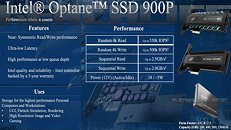Wednesday, October 11th 2017

Optane 900P SSD, Successor to the Intel 750 Series
"Industry contacts" have told TweakTown that a successor to Intel's well received 750 series NVMe drives will launch within weeks. The second generation Optane 900P SSDs will be available in both the U.2 and AIC (PCI-E 3.0) form factors, with capacities of 280, 480, 960 and 1500 GBs. Like the Intel 750 series, the Optane 900P has enterprise roots, namely Intel's ridiculously expensive 375GB P4800X; which we covered earlier. As the 900P is aimed at consumers, maybe more accurately prosumers, prices should be "affordable".Slide courtesy of TweakTown
Optane 900p
Source:
TweakTown
Optane 900p
- (Rumored) Sequential read/write speeds 2.5/2 GB/s
- (Rumored) Random IOPS read/write 550,000/500,000

31 Comments on Optane 900P SSD, Successor to the Intel 750 Series
Ok, I know this is not targeted for home usage, but I wonder what reviews will say when Optane reaches this segment.